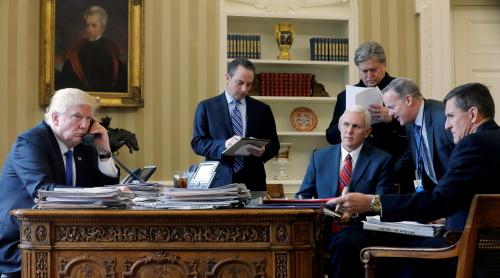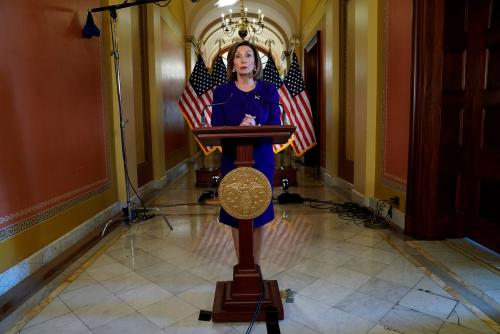Trying to figure out how impeachment will impact the 2020 presidential election is an exercise likely to give you whiplash. No matter how you feel about the president and the process, you can find something that will delight you or depress you. And it may turn out that impeachment won’t matter at all.
At the beginning of the week, Democrats were horrified by polls showing that in six critical 2020 swing states, Trump was doing much better against the Democrats than expected—especially against Warren and Sanders. In addition, in these same six states my colleague Bill Galston wrote that opposition to impeachment and removal was, on average, 8 points more popular than support for it. Fear that impeachment could boomerang and hurt Democrats’ chances of beating Trump in the fall was the reason the House leadership held off taking action for most of last year. At the beginning of the week that fear was back again.
But that was only Monday. By Wednesday a different picture emerged. In three off-year elections—Kentucky, Mississippi and Virginia—Democrats had a very good night. In Kentucky, a state Trump carried by 30 points, the governor’s race remains too close to call with the Democratic candidate holding a small lead. In Mississippi, another solid Trump state, the Democratic candidate for governor lost by only 6 points. Four years earlier the Democratic nominee lost by 34 points. And in Virginia, Democrats picked up enough seats in their legislature to gain control of both houses, making Virginia a completely blue state for the first time in more than two decades. Election results from Kentucky and Virginia showed Democrats continuing their strength in the suburbs—the same places that helped them to victory in 2018.
So does impeachment help or hurt Donald Trump in 2020? Next week the House will begin public hearings. With the release of more testimony this week and the revisions Ambassador Sondland made to his earlier testimony, it is now very clear that there was a “quid pro quo” and that Trump himself was setting the terms. As the legal case got more serious the White House seemed to try to develop a coherent message strategy in place of the throw-spaghetti-at-the-wall strategy that Trump has been executing through his Twitter feed. The guts of that message may well be that Trump’s conduct was unorthodox, but not impeachable.
However, in spite of Washington’s obsession with impeachment, it looks like it was not much of an issue in any of the races this week. In Kentucky, the incumbent Republican Governor Matt Bevin was very unpopular, which may have been more important to the close outcome than the fact that he tried to tag Attorney General Andy Beshear with impeaching Trump. Beshear refused to take the bait. A reporter who covered the massive Des Moines Democratic dinner last weekend noted that only billionaire Tom Steyer mentioned impeachment; the remaining Democratic candidates talked about other things.
Impeachment has taken on enormous importance to the political class because it is an issue of constitutional and historical import. But in the end it may not matter to voters very much at all. Opinion about Trump has been fairly stable since he was elected—he is probably the most polarizing American president since the Civil War—so impeachment may simply play into people’s already hardened attitudes. In addition, other things might end up being more important in 2020. Demographic trends like the maturation of a generation of Latino voters, for instance, may start to have electoral consequences in 2020. There could be as many as six House seats in play in Texas next year. Or there may be other issues, more local in nature, that end up swaying voters. For instance, from October of 2018 to September of 2019 farm bankruptcies rose 24% and reached the highest level seen since 2011.[1] That may undercut Trump’s rural base.
The fact that public opinion on impeachment and opinion on Trump appears to be stuck in a holding pattern may simply be a reflection of a firmly polarized electorate. If, as appears to be the case, a trial in the Senate is wrapped up by early 2020, impeachment may be a distant memory by November.
[1] “Twenty-seven states saw a rise in bankruptcies compared to the previous year. The report also estimates that farm debt will rise to $416 billion by the end of 2019.” Farm Bankruptcies Rise in Over Half of States.
This work is licensed under the Creative Commons Attribution-NonCommerical-NoDerivatives 4.0 International License. To view a copy of the license, visit https://creativecommons.org/licenses/by-nc-nd/4.0/.
The Brookings Institution is committed to quality, independence, and impact.
We are supported by a diverse array of funders. In line with our values and policies, each Brookings publication represents the sole views of its author(s).








Commentary
Will impeachment matter in 2020? This week in impeachment
November 8, 2019